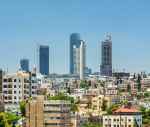You are here
To restore tourism in Jordan
Oct 11,2015 - Last updated at Oct 11,2015
I heard numerous stories and saw first-hand the ways in which lack of tourism is hurting Jordan.
While it is true that tourism can be promoted through television advertising (as noted in an article I read recently in The Jordan Times) by sharing Jordan’s rich history, hospitality, English speaking population and terrific food, it is important to understand where tourists may disconnect from that message.
I offer an alternative view on increasing tourism by understanding and capitalising on the interests of Americans.
Unfortunately, Jordan is lumped in with other countries in the region, marking people believe it is unsafe. My own family, familiar with my “adventurous” expeditions, asked me to cancel my trip to Jordan, citing violence — even though the nearest concerning area to Amman is as far away as Arizona to California.
Unfair, but this is the perception Jordan is battling.
There is, however, a growing population of Americans that is anti-establishment and distrustful of the media, which could be capitalised upon by savvy marketers.
As evident even in American politics, front runners in our presidential race are “outsiders”. Many Americans distrust the media and the government, and a growing number wants true anti-establishment representation.
In America, the Middle East is often regarded in sensationalised stories as a single homogeneous region.
Politicians and the media (assuming these are separate entities) seek to divide people in order to capture supporters and audience by using religion and regional generalisations as scare tactics.
Politicians want us to feel this way, and to elect them to make us more secure. But many Americans are tired of the bad news and inaccurate reporting, as evident by the millions who no longer have cable television, opting instead for online news and advertisement-free programming.
Jordanians should tap into the innate belief of many Americans that people are inherently good in order to revive tourism; and do so person to person.
American opinion, more than ever, is being formed at grassroots level.
The media run a story showing attacks in the Middle East which, combined with lack of understanding of geography and social media use (the crazier and more conspiracy-like the story, the higher the views), turns stories viral and make people more afraid.
In an apathetic and insulated culture driven by technology and waning interest in foreign affairs, people do not educate themselves by verifying what is being reported, but use assumptive information to undergird their foregone conclusions.
I believe bringing American tourism into Jordan is going to require a bottom-up effort by Jordanians sharing their culture and peaceful nature through the one thing Americans spend a lot of time on: Facebook and Instagram.
Jordanians will need to expand their online presence in a peer-to-peer fashion and participate in group discussions about travel to Jordan, rather than rely on business-to-consumer ads through travel and tourism companies.
Americans are on ad-overload, which tunes them out. We run ad blockers on our phones and skip commercials. Television ads will be ineffective. Real stories will be more effective.
Jordanians and returning tourists need to invite others into their lived experiences online, encouraging others to come, too.
“Visit Jordan” groups, openly moderated, should be set up to enthuse potential tourists and calm fears.
The first-hand stories of returning visitors will go a long way to restoring accurate beliefs.
More emphasis could be placed on understanding culture and personal growth as a reason to visit.
University professors across countries could collaborate in the classroom to bring knowledge and understanding of our respective nations, where we often find young people being resentful and distrusting of the media, which pushes them to look online for truth.
This is the reason that the Jordanian experience must be presented online.
I found Jordan to be freer in many ways than America. I felt safe, less hassled, cared for and respected.
I talked with hundreds of Jordanians who were as curious about my life in America as I was about theirs in Jordan.
I shared many kind and enriching experiences with locals.
To be unafraid to visit, people must believe that the hearts and minds of the people are in a peaceful state. This is true in Jordan, but running campaigns counter to the media and politicians in the United States is difficult, expensive and largely ineffective.
Upon arrival back in the US, I returned to my own Jordan: my daughter, intentionally and appropriately named so years ago because her father and I have a great respect for the love and acceptance of Jordanians.
Combined with her middle name (meaning “protector of men”), we hoped she will be both strong and kind, as I have found the Jordanian people to be — a spirit you must convey directly to tourists for them to return.
The writer is an American with a PhD in organisational leadership and technology, a business owner, author and television commentator. She contributed this article to The Jordan Times.












